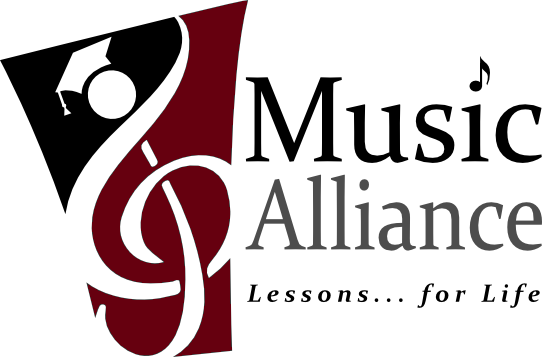THE BENEFITS OF MUSIC STUDY
● Students who participate in school band or orchestra have the lowest levels of current and lifelong use of alcohol, tobacco and illicit drugs among any group in our society.
Concurrent. Res. 266, United States House of Representatives, June 13, 2000
● Arts involvement teaches children many skills necessary to succeed in life, including problem solving and decision making, building self-confidence and self-discipline, the ability to imagine what might be and to accept responsibility for it, teamwork, the development of informed perception, and articulating a vision.
Music for All Foundation - compiled from various research documents and reports
● The College Entrance Examination Board found that students involved in school music programs scored 107 points higher on the SAT's than students with no participation.
Profiles of SAT & Achievement Test Takers, The College Board, compiled by the Music Educators National Conference (2002)
● U.S. Department of Education data on more than 25,000 secondary school students found that students who report consistent high levels of involvement in instrumental music over the middle and high school years show "significantly higher levels of mathematics proficiency by grade 12."
U.S. Department of Education NELLS88 Database
● A research team reports that early music training dramatically enhancing children's abstract reasoning skills. These findings indicate that music uniquely enhances higher brain functions required for mathematics, chess, science and engineering.
From Neurological Research, Feb 28, 1997; Frances Rauscher, Ph.D., Gordon Shaw, Ph.D, University of California, Irvine
● A 2 year Swiss study involving 1,200 children in 50 schools showed that students involved in the music program were better at languages, learned to read more easily, showed an improved social climate, showed more enjoyment in school, & had a lower level of stress than non-music students.
Weber, E.W., Spychiger, M. & Patry, J.L. (1993)
● Music enhances the process of learning. The systems they nourish, which include our integrated sensory, attention, cognitive, emotional and motor capacities, are shown to be the driving forces behind all other learning.
Konrad, R.R., Empathy, Arts and Social Studies, 2000
● Students who were exposed to music-based lessons scored a full 100% higher on fractions tests than those who learned in the conventional manner.
Neurological Research, March 15, 1999
● A study of 7,500 university students revealed that music majors scored the highest reading scores among all majors including English, biology, chemistry and math.
The Case for Music in the Schools, Phi Delta Kappa, 1994
● A study by Dr. Glenn Schellenberg, funded by the International Foundation for Music Research and discussed in Psychological Science magazine, examined the influence of music education on non-musical abilities, the effects of music lessons on academic performance and the development of information-processing and cognitive abilities. In what can be considered breakthrough research, the study has revealed that students who participated in music lessons showed statistically higher IQs (intelligence quotas).
International Foundation for Music Research, June 2004

